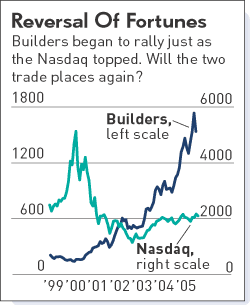Could The Stock Market Benefit If Housing Prices Start To Cool?

Monday, August 29, 2005
By JONAH KERI
If the real estate market softened — or the bubble actually burst — would people funnel their money into stocks instead?
The question isn't academic. Interest rates are rising and real estate stocks are weakening. Federal Reserve Chairman Alan Greenspan, warning of a possible damper on consumer spending, on Friday noted the potential for lower real estate prices.
The opposite switch between real estate and equities took place after stocks topped in early 2000.

"I knew fundamentally and especially psychologically that it would take a long time for the stock market to recover," said South Florida's Richard Schaffer, a onetime financial planner who became a day trader after making more than 50% on his stock investments in 1999.
"So I thought, 'What's the next safe haven?' " Schaffer recalled. "That's when I started directing all my resources into buying real estate."
He wasn't alone.
Many high-risk investors who got their kicks — and their cash — from day trading in the late '90s started funneling money into real estate. As housing prices surged, second homes begat investment properties, which led to more speculative buys.
Real estate in some high-growth areas is now so hot that developers conduct lotteries in which hundreds of people compete for the right to buy a still-unbuilt condo.
Some 8.5% of all homes purchased last year were for investment purposes, according to Loan Performance, a California housing data firm. That's up from an estimated 5.8% in 2000.
In some segments — for instance, Las Vegas condos — investors make up as much as one-quarter of all purchases, Loan Performance says.
Housing's boom, though strong, isn't quite up to the stock market's standards. The Nasdaq rocketed 974% from March 1990 to March 2000. It shot up 149% in the last two frenetic years of that run.
The U.S. median home price has climbed a more subdued 98% in the last 10 years. It's up 24% the past two years.
Some areas have climbed more sharply. Prices in California, Nevada, Florida and Washington, D.C., all surged 30% or more in 2004 alone.
And investment returns can be huge for speculators who buy homes with 0% down payments and flip them a year or two later — or maybe just a few months.
That trumps the stock market, where aggressive investors can use 50% of their own capital and borrow the other 50%.
Property improvements and rental income aren't an issue when flippers can turn around their purchase at light speed, with little or no money risked upfront.
Schaffer now owns a mortgage company and co-owns another mortgage firm as well as a title company.
He typically owns five to seven properties at a time in his own portfolio, mostly in South Florida. A beachfront condo he bought for $185,000 five years ago is now woth close to $1 million.
He's flipped several properties for more than $400,000 after buying in the $200,000 range. In all, Shaffer pegs his gains at well over 50% in each of the last three years.
With those kinds of gains, real estate has grown frothy.
In the second quarter it took 3.2 average household incomes to equal the average home price. The historical average is 2.6.
The value of all U.S. home equity equals 1.3 times the national GDP, also a high level.
Not everyone is convinced a housing bubble is about to pop. Some experts see a soft landing. And real estate corrections can take years to play out.
But if speculators switched from day trading to real estate when the Nasdaq cracked, they could reverse field if home prices do the same.
Stocks already are drawing more money. Mutual fund inflow, which hit a trough in 2002, has perked up since stocks started a bull run in March 2003, according to the Investment Company Institute, the national trade group for U.S. mutual funds.
"Money will gradually flow into stocks, especially if the country stays on the path it's on now — GDP 3.5%, unemployment around 5%, inflation not all that important," predicted Rob Stein, managing director of Astor Asset Management. "People can throw smaller amounts of money into the stock market and remain liquid, as long as businesses are still making money, and jobs and profits keep growing."
But a steep drop in home prices could take a bite out of the economy, noted David Wyss, chief economist for Standard & Poor's. While speculators might shun real estate for stocks, other investors might pause.
The reason: Most homeowners still live in their homes. A drop in home values could make them feel they have less money available to spend and could leave them with less to invest.
"It would become tougher to refinance and take cash out. A lot of consumer spending is tied to buying a house, between furniture and home improvements," said Wyss. "There could come a point where there just won't be a lot of money to use for investments."
What's more, if interest rate hikes accelerate, stocks could be hurt along with home prices. High enough rates could push investors into bonds instead.
On the other hand, a cooling real estate market could take pressure off the Fed to keep raising interest rates. That would help stocks, says Jason Trennert, chief investment strategist for ISI.
"If the housing market peaks," Trennert said, "the economy will slow down. If the economy cools, that should get the Fed out of the way, and that's good for the (stock) market."

 Blogroll Me!
Blogroll Me!
0 Comments:
Post a Comment
<< Home